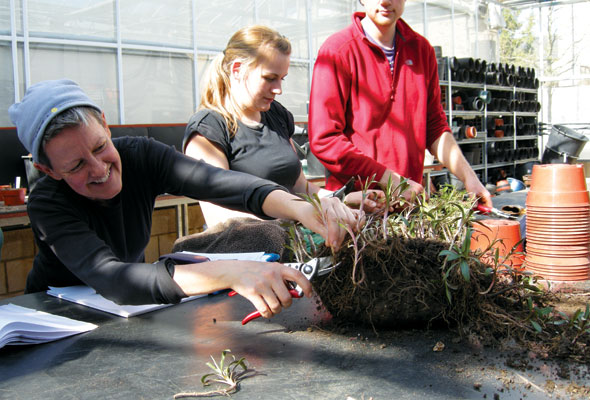The magic of micro-gardens
It all began in 1975 when Mel Bartholomew retired from his engineering consultancy and took up gardening. With a mind trained to question the conventional wisdom, he found himself pondering on the efficiency of planting in rows, which he decided was a hand-me-down from arable farming. He experimented with shortening rows until he came up with a square planting area, growing family-sized portions of vegetables and salads in rigorously subdivided squares, with the minimum of effort and no wasted space.
The result was the SMG (squaremetre gardening) box, made of timber, with a lattice of wooden laths forming a planting grid of nine squares 30cm x 30cm (12in x 12in). Boxes are 15cm/6in deep (a 30cmdeep version can be made for potatoes or carrots), and a plywood base drilled with drainage holes can be added to make the boxes portable and usable on patios, balconies or roof terraces. The SMG box, claims the author, takes up only one-fifth the space of a single-row vegetable garden. He calculates that one box will provide a salad a day for one person throughout the growing season. A family of two adults and two children would require eight SMG boxes for reasonable self-sufficiency.
A key aspect of the system is the use of ‘Mel’s mix’ as the growing medium, a formula consisting of equal parts by volume of garden compost, preferably homemade, peat moss and vermiculite. The contentious element is the peat moss, for which many responsible gardeners and growers are seeking an alternative, as it is non-renewable and in diminishing supply. The author justifies the use of peat moss on the basis that it is used only once when the mix is created. Vermiculite and compost are both renewables, the mix contains all the nutrients, minerals and trace elements plants will need, it is free of weed seed, and so there is no need for fertiliser or pesticides.
There is clear instruction on how to make up the boxes and the grids that mark out the growing spaces, structures such as protective wire cages, plant supports and basic wooden compost bins, and some of the best advice I have read on making compost. A trowel, a pencil – for making planting holes and transplanting seedlings – and scissors are identified as the only tools needed. There is comprehensive advice on sowing, plant spacing, germination, the merits of plant plugs, replanting and a host of other topics. There is a chapter on vertical gardening, which has inspired me to grow next season’s winter squashes up supports. A directory of crops and planting charts will help readers decide what to grow and when.
This is a marvellous book for novice gardeners. It’s a proselytising as well as a practical book and I liked the section advocating SMGs for special needs projects, community gardens and humanitarian projects addressing poverty and hunger.
Square Metre Gardening by Mel Bartholomew is available in March (Frances Lincoln, £12.99): www.franceslincoln.com
Contact Sarah at sarah.langtonlockton@lady.co.uk
What’s on – for gardeners

There are some excellent short courses in 2013 for gardeners who want to brush up their skills or acquire new ones. Here are two that have caught my eye. Cambridge University Botanic Garden (above) offers over 50 courses during the year on topics ranging from botany to basketry. New this year is a two-day Learn To Garden Weekend led by Head of Horticulture Sally Petitt. The course will cover the principles of gardening, including site and planning, preparation and planting, and care and maintenance, and will combine theory and practical sessions to give participants the confi dence to get gardening. Saturday 16 to Sunday 17 March, from 10am to 4pm, £95: www.botanic.cam.ac.uk
Sarah Raven is expanding the courses she runs at Perch Hill Farm in East Sussex. Among the new ones is an inspiring one-day course with plantswoman Chris Marchant, co–owner of Orchard Dene, the nursery that provides plants for many of the best Chelsea show gardens. A Garden For All Seasons is about perennials for year-round colour. 23 April from 10.30am to 3.30pm, £150 including lunch: www.sarahraven.com



